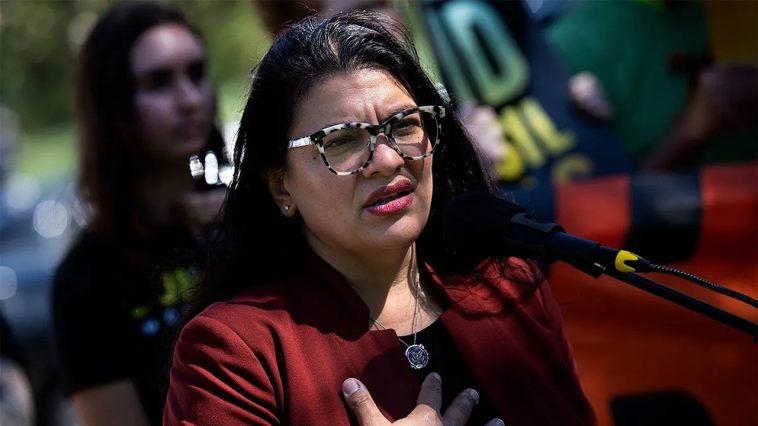LISTEN HERE:
Michigan’s Democratic Representative Rashida Tlaib has pointedly criticized President Biden, suggesting that his inaction contributes to the tragedy of child fatalities in the Middle East.
The outspoken member of the House’s ‘Squad,’ a group of progressive representatives, has not hesitated to take issue with her party’s leader. Her critique of his handling of the escalating conflict between Israel and Hamas has resulted in controversy within her own party.
The lawmaker utilized Instagram on a Sunday afternoon as her platform to voice her grievances. She referred to a news piece by TCD News, detailing that three children lost their lives in South Lebanon due to an Israeli airstrike.
Tlaib directed criticism towards Biden, declaring his silence and perceived unwillingness to act were only exacerbating the situation. ‘Witnessing a generation of children becoming casualties is heart-wrenching,’ she noted.
On October 7, militants from Hamas had made an incursion into Israeli territory, which led to the loss of approximately 1,400 lives, predominantly civilians, which tragically included children and older citizens. The incursion saw numerous Israeli civilians taken captive, with many still being held hostage.
In retaliation, Tel Aviv responded with a barrage of rockets over Gaza, a response that led to the deaths of an estimated 8,500 Palestinians according to the Gaza Health Ministry, a body overseen by Hamas. This counteroffensive has been a source of deep contention within the international community.
Tlaib, as the sole Palestinian-American in Congress, alongside other progressive representatives, has been calling for a cessation of hostilities. They have urged the White House to voice their support for a ceasefire, a call that has, as yet, not been heeded by the administration.
Instead, the Biden administration has advocated for temporary pauses for humanitarian relief. They propose these intermittent periods be used to distribute aid to the affected Palestinian civilians and to secure the release of Israeli hostages trapped in Gaza.
In amplifying her critique, Tlaib posted a video on a recent Friday night, where she made the shocking claim that ‘Joe Biden supported the genocide of the Palestinian people.’ This bold statement intensified the debate even further and set the stage for political backlash.
Directly addressing the President, Tlaib announced, ‘Mr. President, the American people do not stand with you on this one.’ Her message also carried a thinly veiled threat to Biden’s future political aspirations, ‘Your actions would be remembered in 2024.’ These words signify a crucial warning and perhaps a sign of shifting political sentiments.
Nevertheless, Tlaib’s video was met with criticism from within her own ranks. Democratic colleagues were quick to call out her use, and subsequent defense, of the phrase ‘From the river to the sea,’ a statement that critics argue advocates for the elimination of Israel. This contention added another layer of complexity to the ongoing debate.
Embroiled in controversy, the Michigan representative stood her ground, arguing that broader American political leadership, particularly President Biden, are supporting what she perceives as a ‘genocide’ of Palestinians. This strong language shows how heated the debate about American foreign policy has become.
As accusations soared, the White House found itself compelled to respond. Jon Finer, the Deputy national security adviser, addressed the criticism during his appearance on ABC News’ ‘This Week.’ During the conversation, he made it explicit that the Biden administration took issue with the way the conflict was being framed.
Not shying away from the controversy, Finer acknowledged the potent emotional and political charge of the conflict. He noted, ‘This is a conflict that raises strong feelings on all sides, even within the United States.’ His comments underscore the depth and complexity of the conflict and its implications for American domestic politics.
Trying to navigate the fine line between diplomacy and criticism, Finer was cautious in his language, saying that they ‘strongly disagree with…some of the terms used to describe this conflict.’ This position reflects the nuanced stance that the Biden administration is trying to maintain in the midst of strong differing viewpoints within the country.
The disagreement between Tlaib and the Biden administration over the handling of this conflict has added yet another dimension to the broader discourse surrounding American foreign policy. It epitomizes the fine line that political leaders must walk between addressing harsh realities abroad and satisfying political expectations at home.
While the contentious debate continues to unfold, each exchange serves as a stark reminder of the significant differences in approach and viewpoints within the political landscape. It underscores the challenges that exist when attempting to reach a consensus on contentious issues, especially when it involves matters of life and death.



